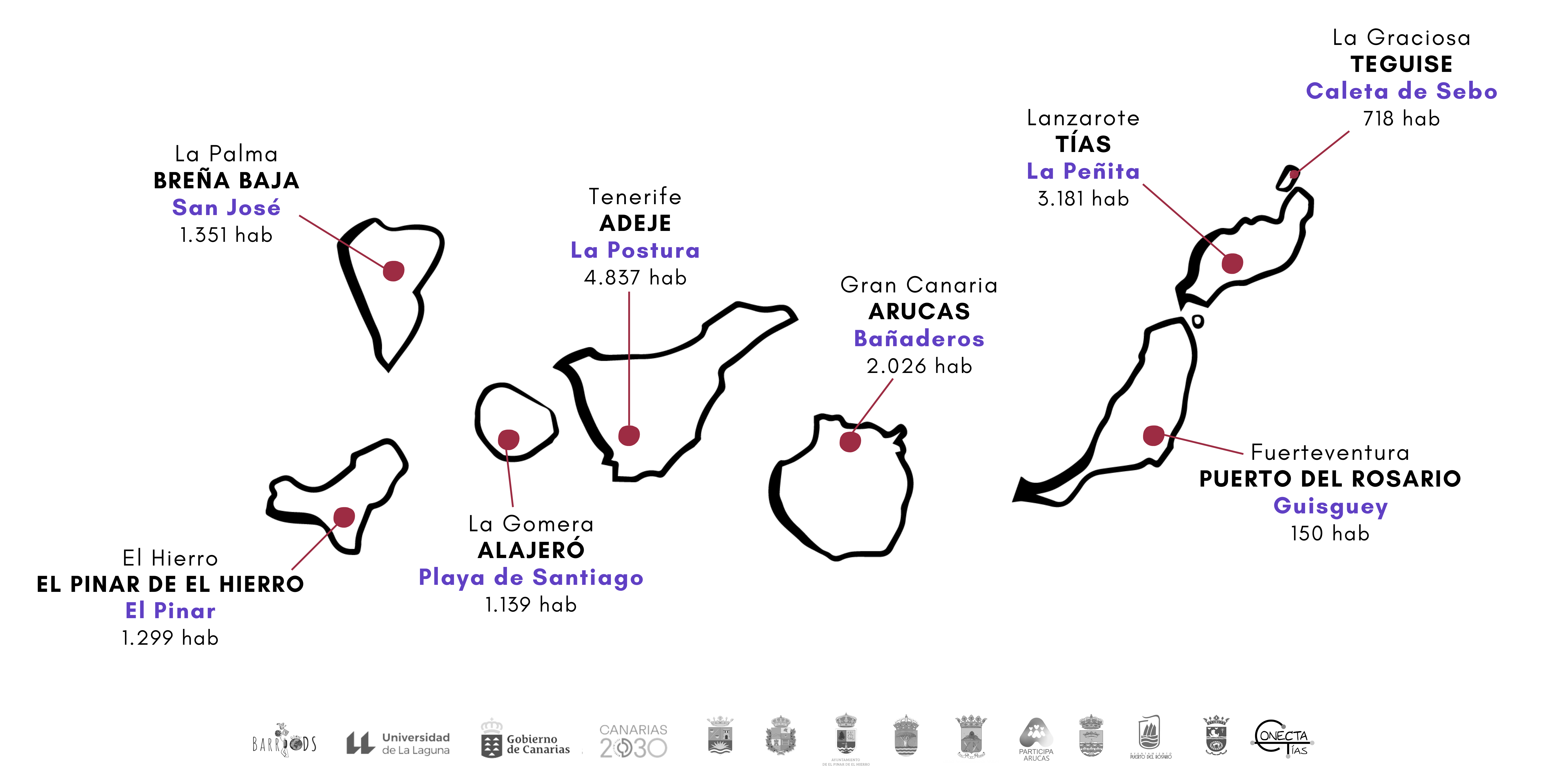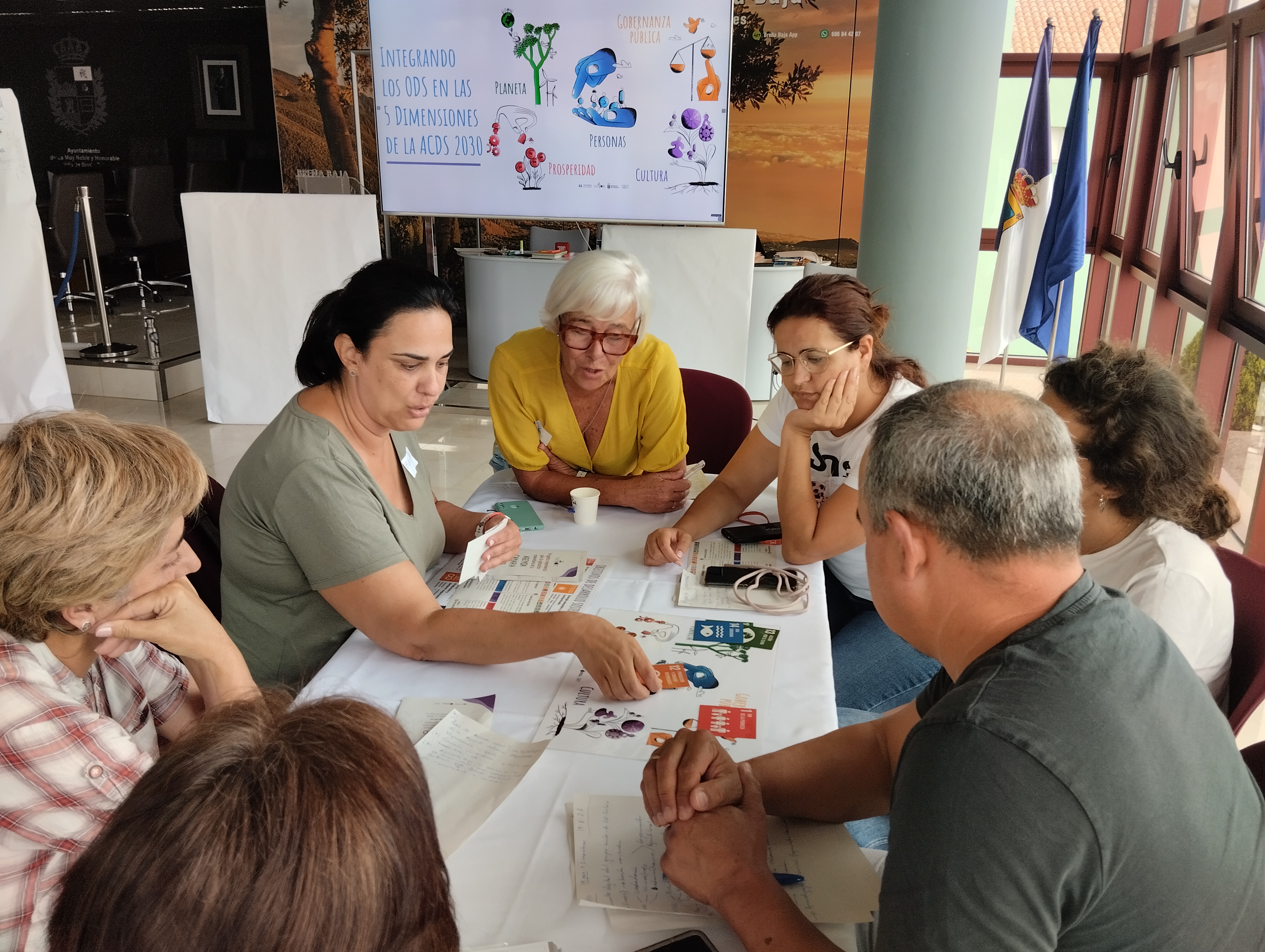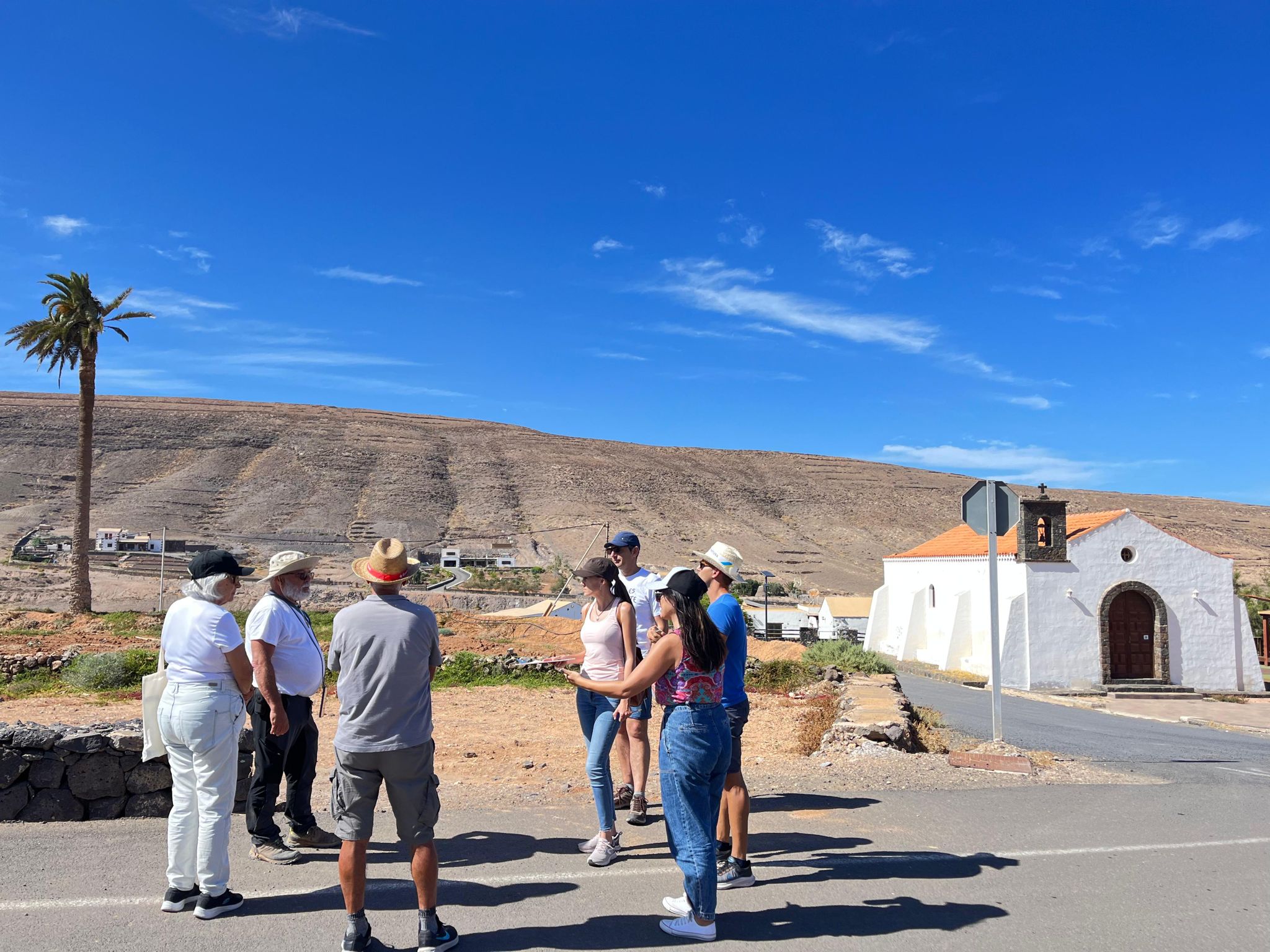‘BarriODS’ Project - Neighbourhoods and towns from Canary Islands for the sustainable development goals
Gobierno de Canarias [The Regional Government of the Canary Islands]
(
Local / Regional Government
)
#SDGAction46126
Description
The initiative is a process of localisation, implementation and consolidation of the Canary Islands 2030 Agenda (https://canarias2030.org/) in a holistic and social framework. The project is based on the implementation of Priority 1.6 (Community approach) and Priority 8.3. (public governance linked to the local reality) of the Regional Agenda (https://www.gobiernodecanarias.org/cmsweb/export/sites/agendacanaria2030/galerias/documentos/agendacanaria2030.pdf).
The aim is to link the protagonists and their local reality to the Canary Islands 2030 Agenda and the SDGs, which means considering their problems and challenges, but also putting the full potential of the neighbourhoods and cities at the service of achieving the Canary Islands goals. The initiative aims to achieve a working methodology that adapts to different types of neighbourhoods and towns, giving them greater capacity, making them more sustainable and, at the same time, becoming a model for other neighbourhoods. This will be achieved through two lines of action. The first involves technical intervention to design, stimulate and facilitate community development processes linked to the Canary Islands 2030 Agenda. This will include training and information activities on the SDGs, the Agenda Canaria 2030 and strategic planning for local development. The second will be the development of a practical guide. This guide can inspire other municipalities in the region that wish to adopt this working methodology.
The project has a duration of one year. The first line of action follows the following outline in four phases:
- Phase 1. During the first five months, the technical team is formed, all the necessary information is gathered so that the team can be trained and a work plan is drawn up. During this time, a public call is made to invite all the municipalities of the Canary Islands to present their candidatures. The technical team classifies the selected territories according to established criteria. The election of the districts is carried out by means of a call to all the municipalities of the Canary Islands. The candidatures must be endorsed by the local councils, social organizations and citizens. The fundamental requirement will be the adhesion of the municipality and the social entities that present themselves to the Canary Islands Agenda 2030.
- Phase II. During the fifth month, applications will be validated by reviewing the documentation. The first face-to-face meetings with local actors are agreed and developed and initial relationships are established.
- Phase III. During the sixth and seventh month, training on sustainability and the Canary Islands Agenda 2030 with a community approach are held in all the selected localities and the Driving Groups are formed. These groups determine the work processes considering the specificities of each neighbourhood or village. In this phase, the driving groups hold the first joint debate.
- Phase IV. In the last six months, the actions related to shared knowledge and community diagnosis for the elaboration of a local development action plan based on the Canary Islands Agenda 2030 have been developed. Finally, the Community Meeting between all the Driving Groups will be held to present their action plans and the process followed will be evaluated in a second shared event. A guide will be presented that compiles the processes developed so that the methodology can be replicated in other territories.
The second line of action is developed in parallel and consists of trying to promote more sustainable and capable neighbourhoods and villages because of a better organization and optimization of resources.
The project is carried out with the collaboration of 8 municipalities of the 8 islands, one for each of the populated islands of the Canary Islands. The selected municipalities applied with the support of the main social and neighbourhood organizations and entities, local technical and professional resources, and citizens, and were selected according to established criteria.
General Information - Universidad y Gobierno impulsan un proyecto experimental para la aplicación local de la Agenda Canaria 2030
General Information - El Proyecto ‘BarriODS’ pretende impulsar la Agenda Canaria 2030
Trainings - Los ODS en tu comunidad: formación gratuita para agentes locales del cambio
Breña Baja - Breña Baja, uno de los ocho municipios seleccionados para aplicar el Proyecto ‘BarriODS’ de la Fundación ULL
La Peñita - La ULL elige la zona turística de Puerto del Carmen para desarrollar el proyecto BarriODS
Guisguey - Guisguey inicia su andadura en el proyecto 'BarriODS' como único representante de la Isla
San José - Taller formativo “Los ODS en tu Comunidad” en San José
Playa de Santiago - El municipio de Alajeró participa en el proyecto ‘BarriODS’
SDGS & Targets
Goal 11
Make cities and human settlements inclusive, safe, resilient and sustainable
11.1
By 2030, ensure access for all to adequate, safe and affordable housing and basic services and upgrade slums
11.1.1
Proportion of urban population living in slums, informal settlements or inadequate housing
11.2
11.2.1
Proportion of population that has convenient access to public transport, by sex, age and persons with disabilities
11.3
11.3.1
Ratio of land consumption rate to population growth rate
11.3.2
Proportion of cities with a direct participation structure of civil society in urban planning and management that operate regularly and democratically
11.4
Strengthen efforts to protect and safeguard the world’s cultural and natural heritage
11.4.1
Total per capita expenditure on the preservation, protection and conservation of all cultural and natural heritage, by source of funding (public, private), type of heritage (cultural, natural) and level of government (national, regional, and local/municipal)
11.5
By 2030, significantly reduce the number of deaths and the number of people affected and substantially decrease the direct economic losses relative to global gross domestic product caused by disasters, including water-related disasters, with a focus on protecting the poor and people in vulnerable situations
11.5.1
Number of deaths, missing persons and directly affected persons attributed to disasters per 100,000 population
11.5.2
Direct economic loss attributed to disasters in relation to global domestic product (GDP)
11.5.3
(a) Damage to critical infrastructure and (b) number of disruptions to basic services, attributed to disasters
11.6
By 2030, reduce the adverse per capita environmental impact of cities, including by paying special attention to air quality and municipal and other waste management
11.6.1
Proportion of municipal solid waste collected and managed in controlled facilities out of total municipal waste generated, by cities
11.6.2
Annual mean levels of fine particulate matter (e.g. PM2.5 and PM10) in cities (population weighted)
11.7
11.7.1
Average share of the built-up area of cities that is open space for public use for all, by sex, age and persons with disabilities
11.7.2
Proportion of persons victim of non-sexual or sexual harassment, by sex, age, disability status and place of occurrence, in the previous 12 months
11.a
Support positive economic, social and environmental links between urban, peri-urban and rural areas by strengthening national and regional development planning
11.a.1
Number of countries that have national urban policies or regional development plans that (a) respond to population dynamics; (b) ensure balanced territorial development; and (c) increase local fiscal space
11.b
By 2020, substantially increase the number of cities and human settlements adopting and implementing integrated policies and plans towards inclusion, resource efficiency, mitigation and adaptation to climate change, resilience to disasters, and develop and implement, in line with the Sendai Framework for Disaster Risk Reduction 2015-2030, holistic disaster risk management at all levels
11.b.1
Number of countries that adopt and implement national disaster risk reduction strategies in line with the Sendai Framework for Disaster Risk Reduction 2015–2030
11.b.2
Proportion of local governments that adopt and implement local disaster risk reduction strategies in line with national disaster risk reduction strategies
11.c
Support least developed countries, including through financial and technical assistance, in building sustainable and resilient buildings utilizing local materials
Goal 16
Promote peaceful and inclusive societies for sustainable development, provide access to justice for all and build effective, accountable and inclusive institutions at all levels
16.1
Significantly reduce all forms of violence and related death rates everywhere
16.1.1
16.1.2
16.1.3
Proportion of population subjected to (a) physical violence, (b) psychological violence and/or (c) sexual violence in the previous 12 months
16.1.4
Proportion of population that feel safe walking alone around the area they live after dark
16.2
End abuse, exploitation, trafficking and all forms of violence against and torture of children
16.2.1
Proportion of children aged 1–17 years who experienced any physical punishment and/or psychological aggression by caregivers in the past month
16.2.2
16.2.3
Proportion of young women and men aged 18–29 years who experienced sexual violence by age 18
16.3
Promote the rule of law at the national and international levels and ensure equal access to justice for all
16.3.1
Proportion of victims of (a) physical, (b) psychological and/or (c) sexual violence in the previous 12 months who reported their victimization to competent authorities or other officially recognized conflict resolution mechanisms
16.3.2
16.3.3
Proportion of the population who have experienced a dispute in the past two years and who accessed a formal or informal dispute resolution mechanism, by type of mechanism
16.4
By 2030, significantly reduce illicit financial and arms flows, strengthen the recovery and return of stolen assets and combat all forms of organized crime
16.4.1
16.4.2
16.5
Substantially reduce corruption and bribery in all their forms
16.5.1
16.5.2
16.6
Develop effective, accountable and transparent institutions at all levels
16.6.1
16.6.2
Proportion of population satisfied with their last experience of public services
16.7
Ensure responsive, inclusive, participatory and representative decision-making at all levels
16.7.1
Proportions of positions in national and local institutions, including (a) the legislatures; (b) the public service; and (c) the judiciary, compared to national distributions, by sex, age, persons with disabilities and population groups
16.7.2
16.8
Broaden and strengthen the participation of developing countries in the institutions of global governance
16.8.1
Proportion of members and voting rights of developing countries in international organizations
16.9
By 2030, provide legal identity for all, including birth registration
16.9.1
16.10
Ensure public access to information and protect fundamental freedoms, in accordance with national legislation and international agreements
16.10.1
16.10.2
16.a
Strengthen relevant national institutions, including through international cooperation, for building capacity at all levels, in particular in developing countries, to prevent violence and combat terrorism and crime
16.a.1
16.b
Promote and enforce non-discriminatory laws and policies for sustainable development
16.b.1
Goal 17
Strengthen the means of implementation and revitalize the Global Partnership for Sustainable Development
17.1
Strengthen domestic resource mobilization, including through international support to developing countries, to improve domestic capacity for tax and other revenue collection
17.1.1
17.1.2
17.2
Developed countries to implement fully their official development assistance commitments, including the commitment by many developed countries to achieve the target of 0.7 per cent of ODA/GNI to developing countries and 0.15 to 0.20 per cent of ODA/GNI to least developed countries; ODA providers are encouraged to consider setting a target to provide at least 0.20 per cent of ODA/GNI to least developed countries
17.2.1
17.3
Mobilize additional financial resources for developing countries from multiple sources
17.3.1
Additional financial resources mobilized for developing countries from multiple sources
17.3.2
17.4
Assist developing countries in attaining long-term debt sustainability through coordinated policies aimed at fostering debt financing, debt relief and debt restructuring, as appropriate, and address the external debt of highly indebted poor countries to reduce debt distress
17.4.1
Debt service as a proportion of exports of goods, services and primary income
17.5
Adopt and implement investment promotion regimes for least developed countries
17.5.1
Number of countries that adopt and implement investment promotion regimes for developing countries, including the least developed countries
17.6
Enhance North-South, South-South and triangular regional and international cooperation on and access to science, technology and innovation and enhance knowledge sharing on mutually agreed terms, including through improved coordination among existing mechanisms, in particular at the United Nations level, and through a global technology facilitation mechanism
17.6.1
Fixed broadband subscriptions per 100 inhabitants, by speed
17.7
Promote the development, transfer, dissemination and diffusion of environmentally sound technologies to developing countries on favourable terms, including on concessional and preferential terms, as mutually agreed
17.7.1
Total amount of funding for developing and developed countries to promote the development, transfer, dissemination and diffusion of environmentally sound technologies
17.8
Fully operationalize the technology bank and science, technology and innovation capacity-building mechanism for least developed countries by 2017 and enhance the use of enabling technology, in particular information and communications technology
17.8.1
17.9
Enhance international support for implementing effective and targeted capacity-building in developing countries to support national plans to implement all the Sustainable Development Goals, including through North-South, South-South and triangular cooperation
17.9.1
Dollar value of official development assistance committed to developing countries
17.10
Promote a universal, rules-based, open, non-discriminatory and equitable multilateral trading system under the World Trade Organization, including through the conclusion of negotiations under its Doha Development Agenda
17.10.1
17.11
Significantly increase the exports of developing countries, in particular with a view to doubling the least developed countries’ share of global exports by 2020
17.11.1
Developing countries’ and least developed countries’ share of global exports
17.12
Realize timely implementation of duty-free and quota-free market access on a lasting basis for all least developed countries, consistent with World Trade Organization decisions, including by ensuring that preferential rules of origin applicable to imports from least developed countries are transparent and simple, and contribute to facilitating market access
17.12.1
Weighted average tariffs faced by developing countries, least developed countries and small island developing States
17.13
Enhance global macroeconomic stability, including through policy coordination and policy coherence
17.13.1
17.14
Enhance policy coherence for sustainable development
17.14.1
17.15
Respect each country’s policy space and leadership to establish and implement policies for poverty eradication and sustainable development
17.15.1
17.16
Enhance the Global Partnership for Sustainable Development, complemented by multi-stakeholder partnerships that mobilize and share knowledge, expertise, technology and financial resources, to support the achievement of the Sustainable Development Goals in all countries, in particular developing countries
17.16.1
Number of countries reporting progress in multi-stakeholder development effectiveness monitoring frameworks that support the achievement of the Sustainable Development Goals
17.17
Encourage and promote effective public, public-private and civil society partnerships, building on the experience and resourcing strategies of partnerships
17.17.1
Amount in United States dollars committed to public-private partnerships for infrastructure
17.18
By 2020, enhance capacity-building support to developing countries, including for least developed countries and small island developing States, to increase significantly the availability of high-quality, timely and reliable data disaggregated by income, gender, age, race, ethnicity, migratory status, disability, geographic location and other characteristics relevant in national contexts
17.18.1
Statistical capacity indicators
17.18.2
17.18.3
Number of countries with a national statistical plan that is fully funded and under implementation, by source of funding
17.19
By 2030, build on existing initiatives to develop measurements of progress on sustainable development that complement gross domestic product, and support statistical capacity-building in developing countries
17.19.1
17.19.2
Proportion of countries that (a) have conducted at least one population and housing census in the last 10 years; and (b) have achieved 100 per cent birth registration and 80 per cent death registration
SDG 14 targets covered
| Name | Description |
|---|---|
| 17.14 | Enhance policy coherence for sustainable development |
Deliverables & Timeline
Start of the project and formation of the technical team
Presentation of the public call through the page of the General Foundation of the University of La Laguna for the selection of eight locations in the Canary Islands, one for each of its populated islands, in order to promote the application community of the Canarian Agenda for Sustainable Development 2030 (ACDS 2030) at the infra-municipal level.
Presentation of the provisional list of the localities selected for the 'BarriODS' Project.
Presentation of the definitive list of the localities selected for the 'BarriODS' Project.
Verification meeting with each of the selected localities and the agents involved to verify what was presented in the call. Each of the territories is visited in person, the first relations are maintained, and the towns and neighbourhoods are toured accompanied by local agents.
First Online Meeting of the 'BarriODS' Project where the project and objectives are presented, as well as the three community figures from each town present their candidacy and their town.
Last face-to-face training 'The SDGs in your community: Local Agents of Change' in the town of El Pinar, El Pinar de El Hierro, El Hierro
Last face-to-face training 'The SDGs in your community: Local Agents of Change' in the town of Bañaderos, Arucas, Gran Canaria.
Last face-to-face training 'The SDGs in your community: Local Agents of Change' in the town of Guisguey, Puerto del Rosario, Fuerteventura.
Last face-to-face training 'The SDGs in your community: Local Agents of Change' in the town of San José, Breña Baja, La Palma.
Last face-to-face training 'The SDGs in your community: Local Agents of Change' in the town of Caleta de Sebo, Teguise, La Graciosa.
Last face-to-face training 'The SDGs in your community: Local Agents of Change' in the town of La Peñita, Puerto del Carmen, Tías, Lanzarote.
Last face-to-face training 'The SDGs in your community: Local Agents of Change' in the town of La Postura, Adeje, Tenerife
Last face-to-face training 'The SDGs in your community: Local Agents of Change' in the town of Playa de Santiago, Alajeró, La Gomera
First Community Meeting of the Motor Groups of each of the selected localities in online format.
Resources mobilized
Partnership Progress




Feedback
Action Network

Timeline
Entity
Region
- Europe
Geographical coverage
Other beneficiaries
The direct beneficiaries of the initiative are the population of the participating territories. In addition, councils and local businesses and organisations will benefit from improvements in coordination, participation and planning
Photos



More information
Countries

Contact Information
David, Director General de Investigación y Coordinación del Desarrollo Sostenible, Gobierno de Canarias

